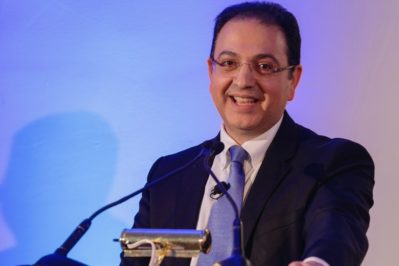Education in today’s globalized landscape is more than just gaining skills for future employment. For a bright future, young people need to learn what it means to be a citizen of the world and agents for positive change. That is exactly what High Resolves, a social venture that runs anti-bias programs in high schools worldwide, aims to do. On this episode of Mastering Innovation on SiriusXM Channel 132, Business Radio Powered by The Wharton School, Mehrdad Baghai, Co-Founder, Chairman, and CEO of High Resolves, who is also the Chairman of Alchemy Growth, shares how he combines his background and expertise on corporate strategy with his passion for social impact, particularly in education.
An excerpt of the interview is transcribed below. Listen to more episodes here.
Transcript
Harbir Singh: Would you give us a quick summary of what High Resolves’ core mission is?

Mehrdad Baghai: Our vision is generating a new generation of young people that are making a positive difference to the world. When we founded the organization about 15 years ago, one of the things we noticed was that there was a rise in hate and divisiveness. And we knew that it was important to get young people to see themselves as global citizens and as people who had a stake in the kind of future that was going to be created, and it was important for us to train them in the kinds of capacities and skills that we’re going to need to be a part of that future.
Singh: So, what are some of the core initiatives you have? That’s a wonderful social mission. And by the way, many of our Wharton students here are deeply interested in social impact. But it’s always a question of how to actually move the needle.
Baghai: Absolutely. One of the things we’ve tried to do is bring an entrepreneurial approach to our social innovation work. In Australia, where we started, we’ve now worked with over 300,000 young people, and the work we do is all around immersive learning experiences that help them build the competencies in the various citizenship areas. For example, we help them learn how they can have more of a collective identity, how they might be more independent thinkers, how they might understand social justice and become social advocates, and how they might lead collective actions. The way we do this work is we have built immersive simulations that we run in schools combined with classroom-based curriculum and project-based work, so that young people can really develop some mastery of these new 21st century skills.
Singh: How do you scale a venture like this?
“To build a social venture, which is doing full benefit work, it is important for it to be self-funding.” — Mehrdad Baghai
Baghai: So, it’s interesting because a lot of the frameworks that apply in terms of corporate growth strategy also apply to the kind of work we’re doing. At the core of our work, we have to have a proposition that’s going to work in a single school and make sure that it’s powerful. One of the things we have done over the years is validate that our approach to immersive learning is attractive and impactful, so that schools have a desire to pay for it. We built a model where we would charge schools for the services that we deliver, and as the number of schools grew in a geographic area, we were able to have a hub that was able to carry its own costs and then some. Then, as we grew the number of hubs, we created an organization in Australia that was self-funding. So, to build a social venture which is doing full benefit work, it is important for it to be self-funding.
If you want to grow fast, you can’t really be limited in terms of investment to just your own earnings stream, so we have used philanthropic grants as well as government support to grow the organization into new geographies. We have new hubs in Australia, we have also grown to North America; we’re in New Orleans and California and Toronto, and we have a joint venture in Brazil and Mexico. In other words, the funding that has come from these other sources has allowed us to expand the footprint. However, we know that over time, the goal of each of these entities is to be able to also get to a self-funding base.
About Our Guest
Mehrdad Baghai is the Chairman of Alchemy Growth, a boutique strategy advisory firm advising large companies on their growth strategies. He specializes in disruptive strategy and designing organization architectures for rapid growth. He is an active investor in both the technology and private equity space collaborating with other institutions like the Macquarie Group. Mehrdad is a frequent lecturer on management theory especially in the growth strategy domain. He is co-author of the New York Times and Wall Street Journal bestseller As One as well as international bestsellers The Alchemy of Growth and Granularity. He was a partner at McKinsey & Company where he co-led the worldwide Growth Practice. Mehrdad served a three-year term as an Executive Director of CSIRO, Australia’s national science agency, with overarching responsibility for growth, investment and commercialization, where he spun out dozens of new technology companies. Mehrdad received a B.S.E. with highest honors from Princeton, an M.P.P. as a Kennedy Fellow at Harvard’s Kennedy School of Government and a J.D. with high honors at Harvard Law School. Mehrdad is a Crown Fellow and winner of the John P. McNulty Prize at the Aspen Institute. In 2017, Mehrdad reduced his business interests to take over as Global CEO of High Resolves, a social venture which he co-founded with his wife Roya in 2005.



